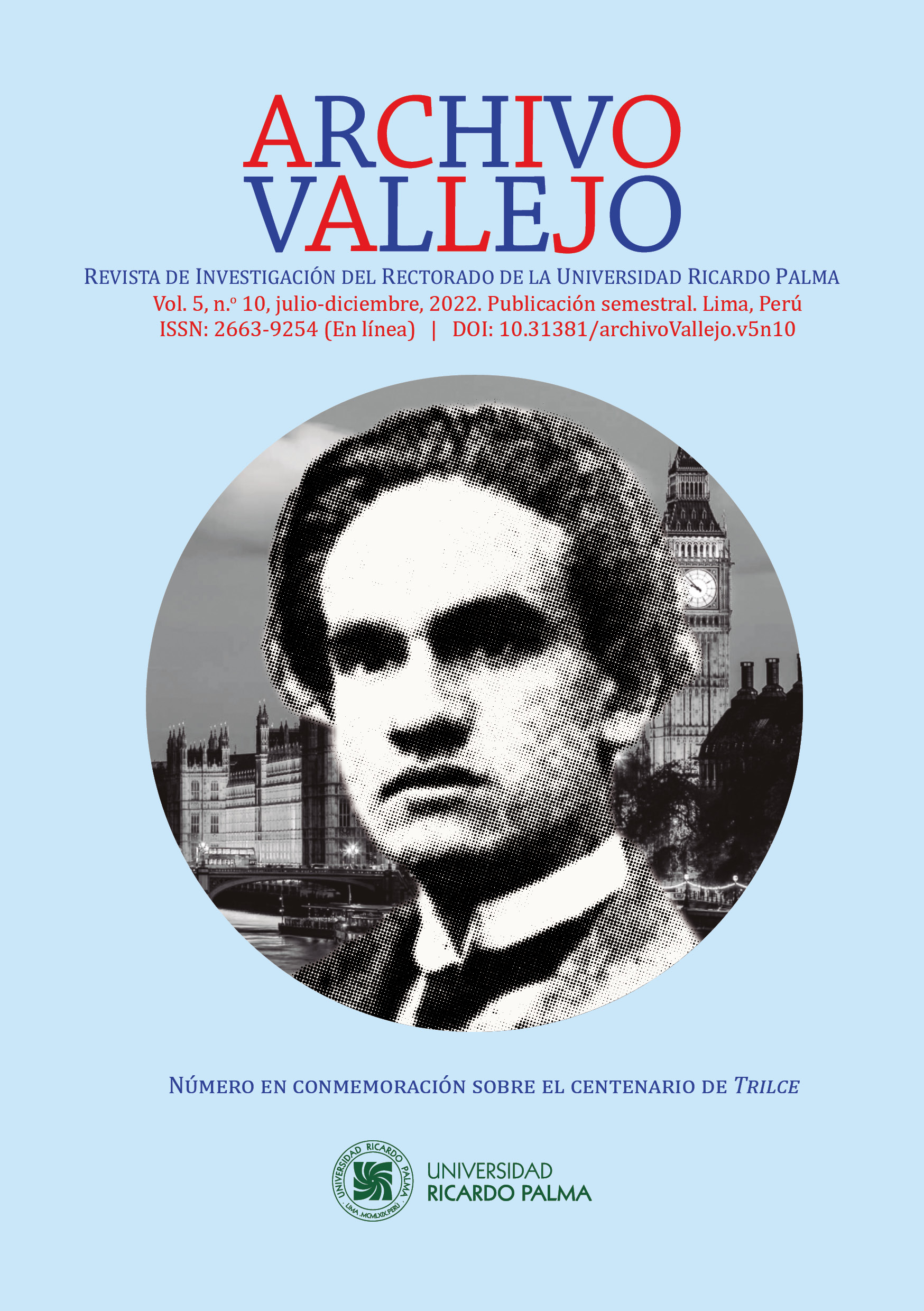The Expediente Vallejo (Vallejo File): César Vallejo's judicial rhetoric and new geneticcritical contributions about his prison stay
DOI:
https://doi.org/10.31381/archivoVallejo.v5n10.5325Keywords:
Vallejo file, judicial rhetoric, genetic-critical contributions, justice, prisonAbstract
The life and work of the Peruvian poet César Vallejo (1892-1938) enjoy wide attention from literary critics. During the 20th century, and in the first decades of the 21st century, a consistent trend within César Vallejo Studies, that is, the critical production centered on Vallejo’s multiple facets as the gentleman, the poet, the storyteller, the playwright, the chronicler, and the essayist, has been preserved. Even though the interpretations have adopted new methodological approaches, and also in spite of the fact that the historical-biographical interest offers important holistic insights, there is an episode in Vallejo’s life that has not to date been analyse in sufficient depth: it is his internment and imprisonment in the jail in Trujillo for 112 days, between November 6, 1920, and February 26, 1921. Our research recognizes that the main national and international biographers have interpreted this event in terms of its traumatic character in the poet’s life, but they have done so while repeating the same structure of events, without having access to the whole of the trial documents in which Vallejo builds his defense on solid legal procedures as much as the testimonies of his accusers. In that sense, the importance of our research lies in the fact that it will be the first time that the legal resources that Vallejo wrote more than a century ago have been released and recently published in the second volume of the book Expediente Vallejo. Proceso penal seguido contra el poeta César Vallejo (Lima: Fondo Editorial del Poder Judicial del Perú, 2021). In this way, we will contribute to an enrichment of our knowledge and understanding of one of the passages of the poet’s life that is well known but which has not until now been sufficiently explained, demonstrated and compared through analysis of the relevant documentary sources of the time.
References
Espejo, J. (1989). César Vallejo: itinerario del hombre, 1892-1923. Seglusa Editores.
Flores, G. y Távara, F. (2021). El expediente Vallejo: una aproximación desde la crítica genética. En Flores, G. y Távara, F. (dirs.), Expediente Vallejo. Proceso penal seguido contra el poeta César Vallejo. t. 1. (pp. XXXI-LIV). Fondo Editorial del Poder Judicial.
Flores, G. y Távara, F. (dirs.) (2021). Expediente Vallejo. Proceso penal seguido contra el poeta César Vallejo. 3t. Fondo Editorial del Poder Judicial.
Hart, S. (2014). César Vallejo. Una biografía literaria. Editorial Cátedra Vallejo.
Orrego, A. (1989). Mi encuentro con César Vallejo. Tercer Mundo.
Patrón, G. (1992). El proceso Vallejo. Universidad Nacional de Trujillo.
Perelman, C. y Olbrechts-Tyteca, L. (1989). Tratado de la argumentación. La nueva retórica. Gredos.
Ramos, C. (2015). Ley y justicia en el Oncenio de Leguía. Fondo Editorial de la Pontificia Universidad Católica del Perú. https://repositorio.pucp.edu.pe/index/bitstream/handle/123456789/173147/Ley
%20y%20justicia%20en%20el%20Oncenio%20de%20Leguia.pdf?sequence=1&isAllowed=y
Távara, F. (2021). El proceso judicial de César Vallejo. En G. Flores Heredia y F. Távara Córdova (dirs.), Expediente Vallejo. Proceso penal seguido contra el poeta César Vallejo. Tomo 1 (pp. XIII-XXX). Fondo Editorial del Poder Judicial.
Távara, F. (2022). Derecho y literatura: a propósito de Enrique López Albújar y César Vallejo. Ius Inkarri, 11(11), 201-223. https://doi.org/10.31381/iusinkarri.v10n10.4646
Vallejo, C. (1984). Crónicas. Tomo I: 1915-1926. Prólogo, cronología, recopilación y notas de Enrique Ballón Aguirre. Universidad Nacional Autónoma de México.
Downloads
Published
How to Cite
Issue
Section
License
Copyright (c) 2022 Gladys Flores Heredia

This work is licensed under a Creative Commons Attribution 4.0 International License.
Los contenidos publicados en la revista están bajo una licencia CC-BY 4.0, la cual permite:
- Compartir, copiar y redistribuir el material en cualquier medio o formato.
- Adaptar, remezclar, transformar y construir a partir del material para cualquier propósito, incluso comercialmente.
Bajo los siguientes términos:
- Atribución. Usted debe dar crédito de manera adecuada, brindar un enlace a la licencia, e indicar si se han realizado cambios. Puede hacerlo en cualquier forma razonable, pero no de forma tal que sugiera que usted o su uso tienen el apoyo de la licenciante.















